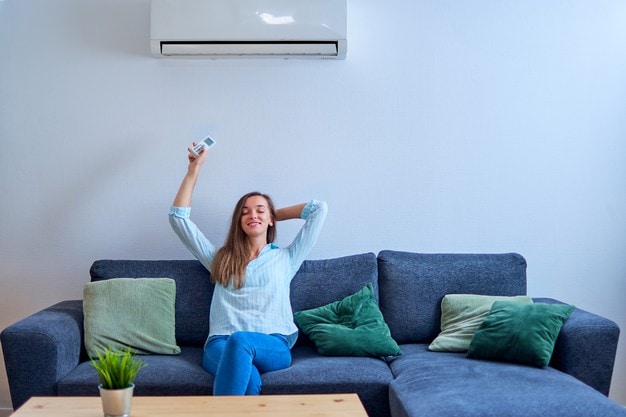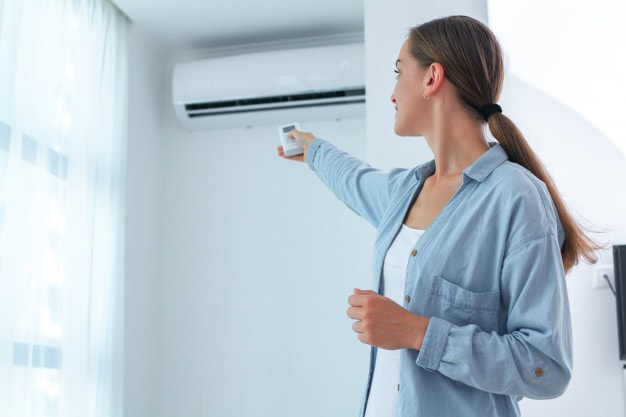
Are you thinking about buying an air conditioner (or an air conditioner with heater) for your home? At Hello Breeze, we know that it's the kind of decision that can keep you awake through the night. And that's not just because sweltering evenings prevent you from dozing off.
The other part of the problem is that instead of falling into a happy, dream-filled sleep, your brain is perplexed with questions like, "What size air conditioner do I need?,"What's the best air conditioner of all the brands on the market?," and, "When people buy air conditioner units for their homes, do the utility bills go out of control?"
The Hello Breeze team would like to help you get some rest. We look at it as our job to give you clear answers. In fact, people call us every day and ask questions like those, so don't worry, you're not alone. Just about every homeowner wants to know four things when they decide to take action and purchase an AC unit. What are the four?
Of course, that's not an exhaustive list, but those are definitely the "big four" questions our technicians hear when they answer the phones or open their email boxes every day. And you know what? It's not that consumers are uninformed.
The thing is, most folks don't buy air conditioner units very often. That's because if you get a quality product and have it installed by professions, and if you maintain it properly, it can last for many years. So, the fact of the matter is that most people just don't know a whole lot about the subject.
That's okay, though. Hello Breeze has your back. We're here to clear things up on a topic that can be confusing, frustrating, and downright maddening at times. So, sit back and let your brain absorb a few interesting facts. A few minutes from now, you'll probably have a much clearer idea about what the best air conditioner is for your home. Plus, tonight you won't be kept awake by all those nagging questions.
Get a Fast Air Con
Quote Today!
When you set out to buy an AC unit, you'll be faced with at least five different types to choose from. Here's the quick version of the key points:
At least once a day, people ask us, "What size air conditioner do I need?" It's a good question. No one wants to make the same mistake Goldilocks made, getting the first two choices wrong before accidentally getting it right the third time. Why not get it right the first time? You'll save money and avoid a bunch of hassles.
Here's the good oil about AC sizes: All the charts and calculators in the world won't give you the perfect answer. For that, you'll need to have a licensed contractor check out your home in person, do some measurements, and size up the situation on the spot. But, for now, you can make an educated guess, or reasonable estimate based on the following chart:
Based on the size of the area you want to cool, there is an accompanying kW size AC that will work best:
Be careful going too big or too small with your choice. An AC that's too small will have to work extra hard and will wear itself out rather quickly. One that's too big will only cycle for short periods at a time, which also is hard on the components, over-cools the space, and costs more than necessary to run.

It's easy to get caught up in the different kinds of air conditioners, their sizes, and their features. Too often, the idea of energy use is forgotten. But if you ever asked yourself, "How much electricity does an air conditioner use?," you're on the right track.
That's because if you have that question, it's easier to narrow down your choices based on energy consumption. Also, being concerned about energy use means you'll pay close attention to getting a unit that is suited to your home's size, rather than one that's too big or too small.
Here's a fact that most consumers don't usually know: There is no "best air conditioner" on the market. But, there is a best air conditioner for your home. AC units are like fine clothing, in a strange way. By that, we mean that everyone has their own fashion preferences, sizes, and budgets. No two people have the exact same wardrobe.
Air conditioners are like that. You have to take a lot of factors into account to find the one that suits your needs, budget, home size, and personal preferences. So, what about the electricity question?
Most units use between $250 and $600 per year in electricity, based on average cost to run a typical air conditioner. Why is that range so wide? A couple of reasons. First, and probably the most relevant one is the size of the unit.
Any AC up to 4kW is considered "small," and can use between $250 and $500 worth of energy, with the variables of weather conditions and how often you run the unit making the difference between the high and low end of the scale.
Unit sizes between 4kW and 6kW are considered "medium," and use between $400 and $550 per year in energy. Large units, meaning anything in excess of 6kW, use between $450 and $600 in energy per year, on average.
If you ever want to get a really long answer to a short question, the next time you visit a car dealer, ask this: "What kinds of features are available on this vehicle?" Get ready for at least a one-hour dissertation.
Well, the situation is not as bad with air conditioners, but there are lots of features. We won't go over all of them here, but you should know about the ones people ask about most often. They include the following:
Now that you know all the pertinent facts about the different kinds and sizes of air conditioners, you can get some sleep and know what to look for when you get serious about buying a unit for your home. Don't forget to give Hello Breeze a call if you have any lingering questions. We're always happy to talk about air conditioners. Our direct line is 1300 712 732. Stay cool.